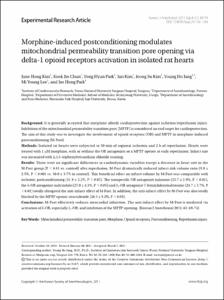KUMEL Repository
1. Journal Papers (연구논문)
1. School of Medicine (의과대학)
Dept. of Preventive Medicine (예방의학)
Morphine-induced postconditioning modulates mitochondrial permeability transition pore opening via delta-1 opioid receptors activation in isolated rat hearts
- Keimyung Author(s)
- Lee, Mi Young
- Department
- Dept. of Preventive Medicine (예방의학)
- Journal Title
- Korean Journal of Anesthesiology
- Issued Date
- 2011
- Volume
- 61
- Issue
- 1
- Keyword
- Mitochondrial permeability transition pore; Morphine; Opioid receptors; Postconditioning; Reperfusion injury
- Abstract
- Background: It is generally accepted that morphine affords cardioprotection against ischemia/reperfusion injury. Inhibition of the mitochondrial permeability transition pore (MPTP) is considered an end target for cardioprotection. The aim of this study was to investigate the involvement of opioid receptors (OR) and MPTP in morphine-induced postconditioning (M-Post). Methods: Isolated rat hearts were subjected to 30 min of regional ischemia and 2 h of reperfusion. Hearts were treated with 1 μM morphine, with or without the OR antagonists or a MPTP opener at early reperfusion. Infarct size was measured with 2,3,5-triphenyltetrazolium chloride staining. Results: There were no significant differences in cardiodynamic variables except a decrease in heart rate in the M-Post group (P < 0.01 vs. control) after reperfusion. M-Post dramatically reduced infarct-risk volume ratio (9.8 ± 2.5%, P < 0.001 vs. 30.0 ± 3.7% in control). This beneficial effect on infarct volume by M-Post was comparable with ischemic postconditioning (11.9 ± 2.2%, P > 0.05). The nonspecific OR antagonist naloxone (25.7 ± 1.9%, P < 0.01),
the δ-OR antagonist naltrindole (27.8 ± 4.3%, P < 0.05) and δ1-OR antagonist 7-benzylidenenaltrexone (24.7 ± 3.7%, P < 0.01) totally abrogated the anti-infarct effect of M-Post. In addition, the anti-infarct effect by M-Post was also totally blocked by the MPTP opener atractyloside (26.3 ± 5.2%, P < 0.05). Conclusions: M-Post effectively reduces myocardial infarction. The anti-infarct effect by M-Post is mediated via activation of δ-OR, especially δ1-OR, and inhibition of the MPTP opening.
- Keimyung Author(s)(Kor)
- 이미영
- Publisher
- School of Medicine
- Citation
- June Hong Kim et al. (2011). Morphine-induced postconditioning modulates mitochondrial permeability transition pore opening via delta-1 opioid receptors activation in isolated rat hearts. Korean Journal of Anesthesiology, 61(1), 69–74. doi: 10.4097/kjae.2011.61.1.69
- Type
- Article
- ISSN
- 2005-6419
- Appears in Collections:
- 1. School of Medicine (의과대학) > Dept. of Preventive Medicine (예방의학)
- 파일 목록
-
-
Download
 oak-aaa-03403.pdf
기타 데이터 / 197.17 kB / Adobe PDF
oak-aaa-03403.pdf
기타 데이터 / 197.17 kB / Adobe PDF
-
Items in Repository are protected by copyright, with all rights reserved, unless otherwise indicated.